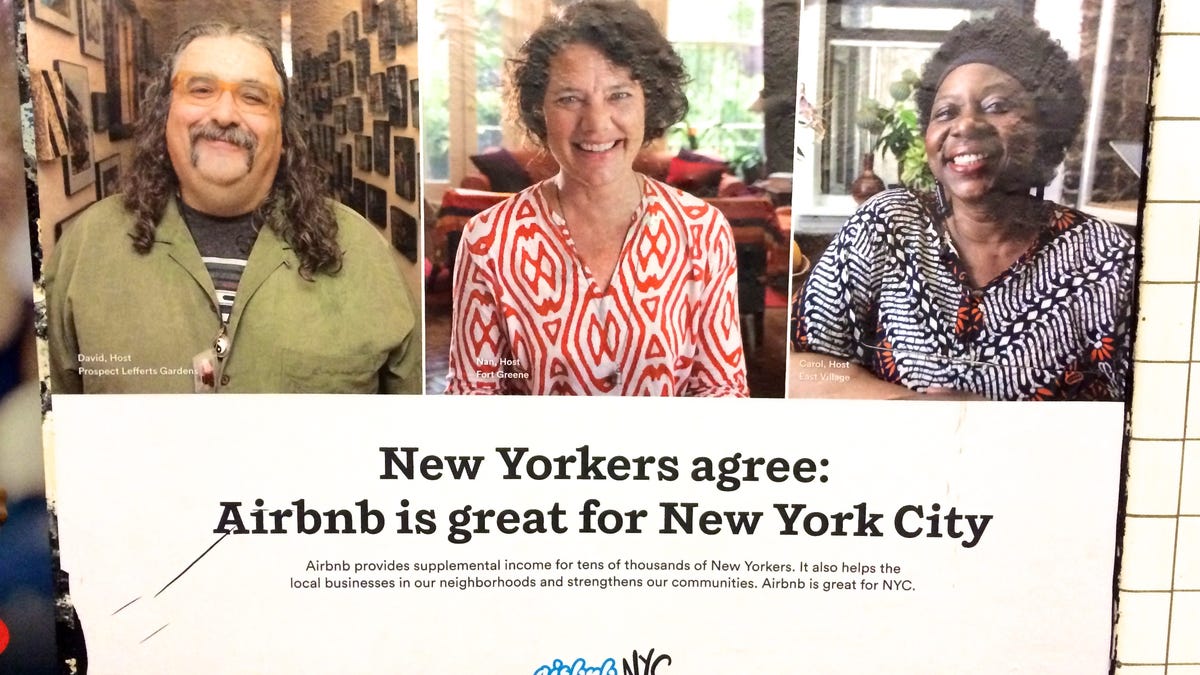Airbnb partly to blame for higher rents, says New York City
A new report says the service is responsible for nearly 10 percent of rental increases between 2009 and 2016. Airbnb says that's bogus.

Airbnb plastered these posters throughout the city's subway stations for one of its marketing campaigns.
New York City officials say rising rents across the city are partially Airbnb's fault.
The city's comptroller, Scott Stringer, released a report Thursday that says Airbnb is responsible for nearly 10 percent of citywide rental increases between 2009 and 2016. When he crunched the numbers, he found that New Yorkers paid a combined total of $616 million extra in rent in 2016 because of Airbnb.
"For years, New Yorkers have felt the burden of rents that go nowhere but up, and Airbnb is one reason why," Stringer said in a statement. "Affordable apartments that should be available to rent never hit the market, because they are making a profit for Airbnb."
Airbnb has gone from a website for couch surfers to having a massive online presence in just under a decade. It lists roughly 4.5 million homes for rent in more than 81,000 cities. While the site can help people earn money by renting out their home, lawmakers worldwide have raised concerns about Airbnb's role in taking rentals off the market and worsening the housing crunch.
The company has battled local governments from San Francisco to New Orleans to London. Though it's worked out deals with many cities' regulators, it's had to scale down its offerings and adjust to rules that require hosts to register with cities and curb how many nights a year people can rent out a home.
Airbnb experienced a particularly long tussle with New York, which has enacted laws making it illegal for New Yorkers to rent out a whole apartment on Airbnb for fewer than 30 days if they're not present. The idea is to crack down on property owners who have essentially capitalized on short-term rentals by converting residential buildings into impromptu hotels.
For its part, Airbnb says Stringer's report paints an inaccurate picture of its impact on the city. The company says the findings assume that all Airbnb rentals are homes permanently removed from the market, but in reality many people listing on Airbnb live in their homes and are only renting them out several weeks a year.
"The majority of our hosts are sharing the home in which they live, not removing permanent housing from the market," Airbnb wrote in a lengthy response to Stringer's report. "Home prices in New York City were soaring long before Airbnb was even founded."
Airbnb says more than 53,000 people list their homes for rent on its site in New York City and 2.6 million visitors stayed in those rentals in 2017. On average, a typical Airbnb host made $6,700 last year, the company says. Airbnb added that in predominantly Latino neighborhoods it helped its hosts generate a combined total of $60 million, and in predominantly black neighborhoods that total was $70 million.
To get his findings, Stringer scraped data from Airbnb's listings using a third-party company called AirDNA and then analyzed that against housing stock and rent prices. He said he took into account other factors that drive rent increases. Stringer found that in certain neighborhoods -- where Airbnb is the most concentrated -- the average price of an apartment has increased by more than $100 per month in extra rent.
"Airbnb has grown exponentially at the expense of New Yorkers who face rising rents and the risk of being pushed out of communities they helped build," Stringer said. "If we're going to preserve the character of our neighborhoods and expand our middle class, we have to put people before profits. It's that simple."
AirDNA issued a statement on Friday saying Stringer has misinterpreted its data. The data and analytics company said that the comptroller didn't contact it or ask for guidance in reading its data. AirDNA said it found 0.2 percent of homes were taken off the market in New York City due to Airbnb, rather than the nearly 10 percent that Stringer found.
"In New York City, just over 5,300 entire homes were rented on Airbnb for six months or more in the past year, representing 0.2 percent of the total housing supply," said AirDNA CEO Scott Shatford. "It is impossible for Airbnb to have a material impact on rental prices."
But Stringer said he stands by his math. A spokeswoman for the comptroller's office said Friday that it "operates independently and performs unbiased analyses of data we deem reliable and consistent," and added that its "conclusion would be the same whether apartments were listed part-time or full-time on Airbnb."
"Our report explicitly stated that Airbnb was responsible for 9.2 percent of the increase in housing costs -- not 100 percent," the spokeswoman said. "We are not disputing the right of homeowners or renters to lawfully rent space in their apartments. But the lack of transparency and enforcement in this industry is resulting in abuses that are undeniably and measurably impacting affordability in our city."
First published May 3, 11:49 a.m. PT.
Update, May 4 at 12:35 p.m.: Includes additional information and comment from AirDNA CEO Scott Shatford.
Update, 3:44 p.m.: Adds comment from the spokeswoman for New York City's Comptroller Scott Stringer.
CNET Magazine: Check out a sample of the stories in CNET's newsstand edition.
Life, disrupted: In Europe, millions of refugees are still searching for a safe place to settle. Tech should be part of the solution. But is it?

